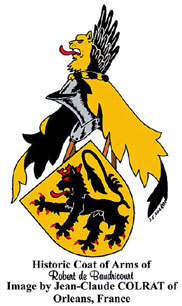 Baudricourt, Robert – The French leader of the town of Vaucouleurs. Jehanne went first to him for an escort to the see the king.
Baudricourt, Robert – The French leader of the town of Vaucouleurs. Jehanne went first to him for an escort to the see the king.NOTE – Each month has been "bookmarked" to enable readers to more easily navigate this document to particular times of Jehanne’s life.
Introduction
This brief introduction will help people unfamiliar with the history and geography of the time gain a better understanding in which to relate to this mini biography.
Sources
I have compiled this mini-biography as an aid to those wishing to understand the story of Jehanne la Pucelle (Joan of Arc) and her testimony concerning God’s mission for her life. One, perhaps new to studying about her, can gain a great understanding in a short time period. Of course, you should read many other sources to gain a more complete understanding of her life and her time period. In some cases, some of the details among my various sources conflict as to the exact dates or sequence of events, in which case I have used the most probable dates and events based upon my research. I have omitted footnotes to save time in preparing this document, as almost every other sentence would have to be noted. Regarding spelling, I have omitted French ascent marks, as this document will probably be also saved as a text file and these do not convert.
I have made extensive use of the following works:
1. Saint Joan of Arc by Vita Sackville-West, copyright 1936.
2. Joan of Arc, Her Story by Regine Pernoud and Marie-Veronique Clin, revised and translated by Jeremy Duquesnay Adams, copyright 1998.
3. Jeanne D’Arc, Her Life, Her Death, and the Myth by W. S. Scott, copyright 1974.
4. Joan of Arc, A Military Leader by Kelly DeVries, copyright 1999.
5. Joan of Arc in Her Own Words compiled and translated by Willard Trask, copyright 1996.
6. The Trial of Condemnation translated by W.P. Barrett done in 1932
I have also used the following works to a lesser extent:
7. Joan of Arc by Mary Gordon, copyright 2000
8. The Spiritual Way of St. Jeanne d’Arc by George H. Tavard, copyright 1998.
Names
A brief list of important names associated with Jehanne’s story is as follows:
 Baudricourt, Robert – The French leader of the town of Vaucouleurs. Jehanne went first to him for an escort to the see the king.
Baudricourt, Robert – The French leader of the town of Vaucouleurs. Jehanne went first to him for an escort to the see the king.
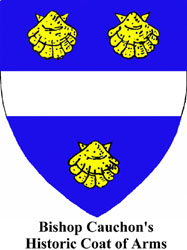 Cauchon, Pierre - He was the bishop of Beauvais. He lost his position when the town decided to support the French and he was forced to flee to Rouen. He helped draft the treaty of Troyes in 1420 that effectively gave the crown of the kingdom of France to the English. He was an ardent supporter of the English cause and asserted himself when Jehanne was captured to be able to be the chief judge at her trial.
Cauchon, Pierre - He was the bishop of Beauvais. He lost his position when the town decided to support the French and he was forced to flee to Rouen. He helped draft the treaty of Troyes in 1420 that effectively gave the crown of the kingdom of France to the English. He was an ardent supporter of the English cause and asserted himself when Jehanne was captured to be able to be the chief judge at her trial.
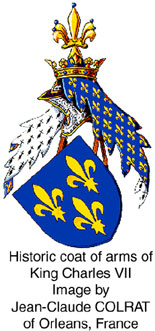 Charles VII – He became quasi-king of France in 1422 when his father, Charles VI died. However, he had never been crowned at the traditional site of Reims and anointed with the holy oil. His kingship was in doubt due to the Treaty of Troyes in 1420, in which his mother helped negotiated a treaty that effectively recognized the King of England as also the king of France. This treaty caused some to doubt he was the legitimate heir. Because he was not yet crowned in an official ceremony at Reims, he was often called the Dauphin (i.e. the heir apparent to the crown).
Charles VII – He became quasi-king of France in 1422 when his father, Charles VI died. However, he had never been crowned at the traditional site of Reims and anointed with the holy oil. His kingship was in doubt due to the Treaty of Troyes in 1420, in which his mother helped negotiated a treaty that effectively recognized the King of England as also the king of France. This treaty caused some to doubt he was the legitimate heir. Because he was not yet crowned in an official ceremony at Reims, he was often called the Dauphin (i.e. the heir apparent to the crown).
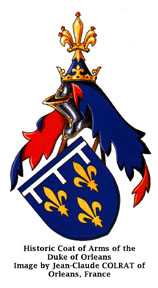 Charles, Duke of Orleans – He had been held prisoner since October 25, 1415, when captured at the battle of Agincourt (a major English victory of the war). He was ultimately freed in 1440. His return from England was one of Jehanne’s stated goals.
Charles, Duke of Orleans – He had been held prisoner since October 25, 1415, when captured at the battle of Agincourt (a major English victory of the war). He was ultimately freed in 1440. His return from England was one of Jehanne’s stated goals.
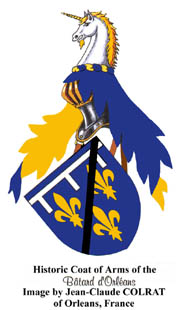 Jean, Bastard of Orleans – the half brother of the Duke of Orleans. Later in his life would receive the title of Count of Dunois. He was the leader of the city of Orleans as the Duke was held prisoner in England.
Jean, Bastard of Orleans – the half brother of the Duke of Orleans. Later in his life would receive the title of Count of Dunois. He was the leader of the city of Orleans as the Duke was held prisoner in England.
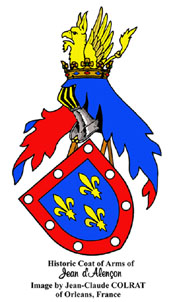 Jean, Duke of Alencon – A cousin of Charles VII. He was an important military leader and became one of Jehanne’s closest friends and firmly believed in and supported her mission as being from God. He himself had been a prisoner of war for some five years in the mid to late 1420’s.
Jean, Duke of Alencon – A cousin of Charles VII. He was an important military leader and became one of Jehanne’s closest friends and firmly believed in and supported her mission as being from God. He himself had been a prisoner of war for some five years in the mid to late 1420’s.
 Jehanne la Pucelle (Joan of Arc) – Her French name spelled as it was in Old French; la Pucelle means the maid, understood at the time to mean a virgin. The modern French spelling drops the "h" and is now commonly spelled as Jeanne. (Her name is pronounced to rhyme with "lawn" and the "j" pronounced like the "s" in the word "pleasure." Her father’s last name was Darc; some time after his death the apostrophe was added; hence D’Arc. Many people of that day, unless famous, did not use a last name; if they did so, daughters sometimes used their mother’s last name. The English translation is either Joan the Maid, or Joan of Arc. I choose to use the name "Jehanne", the way she spelled it herself, to honor her.
Jehanne la Pucelle (Joan of Arc) – Her French name spelled as it was in Old French; la Pucelle means the maid, understood at the time to mean a virgin. The modern French spelling drops the "h" and is now commonly spelled as Jeanne. (Her name is pronounced to rhyme with "lawn" and the "j" pronounced like the "s" in the word "pleasure." Her father’s last name was Darc; some time after his death the apostrophe was added; hence D’Arc. Many people of that day, unless famous, did not use a last name; if they did so, daughters sometimes used their mother’s last name. The English translation is either Joan the Maid, or Joan of Arc. I choose to use the name "Jehanne", the way she spelled it herself, to honor her.
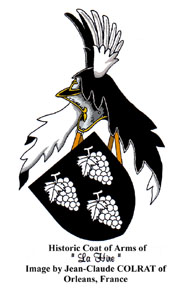 La Hire (real name Etienne de Vignolles) – One of the top French military leaders. A very coarse man, he initially bristled at Jehanne’s "spiritual" ways, he nonetheless followed her wishes and greatly reduced his cursing, and even went to confession.
La Hire (real name Etienne de Vignolles) – One of the top French military leaders. A very coarse man, he initially bristled at Jehanne’s "spiritual" ways, he nonetheless followed her wishes and greatly reduced his cursing, and even went to confession.
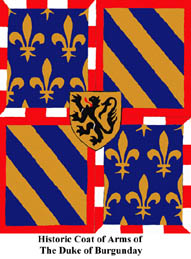 Philip the Good, Duke of Burgundy – The leader of the Burgundian party. His father, Jean the Fearless, was assassinated in 1420, and Philip became the leader. He aligned himself with the English.
Philip the Good, Duke of Burgundy – The leader of the Burgundian party. His father, Jean the Fearless, was assassinated in 1420, and Philip became the leader. He aligned himself with the English.
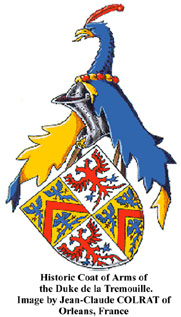 Tremoille, Georges de la – Reported to be the richest man in France, he was perhaps Charles VII top advisor. He always favored diplomacy and treaties and opposed Jehanne’s military missions as much as possible.
Tremoille, Georges de la – Reported to be the richest man in France, he was perhaps Charles VII top advisor. He always favored diplomacy and treaties and opposed Jehanne’s military missions as much as possible.
History
The English and French began what is now called the Hundred Years War in 1337 during the reign of Edward III. Not so much a war in the modern sense, but a slow series of major battles, often years apart, followed by years of small raids and skirmishes. To make matters worse, the French were engaged in a sort of "civil war." In 1420 Jean the Duke of Burgundy (John the Fearless) was assassinated. Partisans of Charles VI were blamed and this caused the Burgundians to align themselves with the English. Henry V had married a French royal. The Treaty of Troyes in 1420, endorsed by Charles VII own mother, effectively froze him out of succession of the French kingship and declared the successor to Henry V king over both England and France. Henry V died suddenly, leaving Henry VI, a small child, now technically king over both England and France. Charles VI had fits of madness that would leave him incapable of governing for months at a time. It was during one of these bouts that his wife endorsed the treaty leaving his son out of the kingship. Still, many French were loyal to Charles VII when Charles VI died in 1422. However, by 1429 the French were losing the ware badly and Charles VII had no money to operate with.
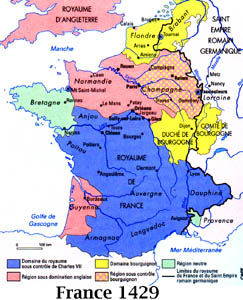
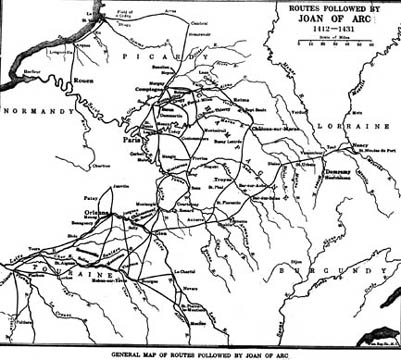
Geography
– Jehanne’s story takes place in the northern half of France.Chinon
– Located about 80 miles southwest of Orleans on the Vienne River. It was home to a very large castle where Charles VII lived during much of the 1420’s.Compiegne
– Located about 50 miles directly north of Paris on southern side of the intersection of the Aisne and Oise rivers.Domremy
– A small French village in eastern France on the Meuse river, Jehanne’s birthplace.Orleans
– Located on the northern bank of the Loire River about 80 miles directly south of Paris. The English started a siege of this city in October 1428.Paris
– The largest French city; it was captured by the English in 1419. Located on the Seine River.Reims
– A city 90 miles east-northeast of Paris. It was the traditional site of coronation for French kings for almost a thousand years.Rouen
– The seat of English government controlling France. Also located on the Seine River about 70 miles northwest of Paris. Jehanne’s trial and execution was held here.Vaucouleurs
– The largest French controlled city in eastern France, about 10 miles from Domremy. Vaucouleurs was about 350 miles northeast of Chinon.Readers will note that I have written this mini-biography in the present tense (except when using direct quotes from journals of the day). I hope this technique will stir your imagination to accompany Jehanne on her God-appointed journey. I have tried to keep my personal comments to a minimum and let Jehanne’s testimony of all God has done in her life come forth.
January 1412
The 6th
– Jehanne is born in Domremy to Jacques Darc and Isabelle Romee. She has two older brothers Jacquemin and Jean. A younger brother Pierre and a sister Catherine (unclear as to her being older or younger) will also be her siblings.Lord Perceval de Boulainvilliers later claimed that the roosters of the village, "like heralds of a new joy", hailed her birth by crowing long before dawn, as if to announce a different type of dawn.
Since there are no dates to associate several of Jehanne’s known childhood activities, we shall take this opportunity to discuss some of them.
Jean Minet baptized her. She had 10 godparents:
Jeanne, wife of Aubery, mayor of Domremy,
Agnes,
Jeanne, wife of Thevenin (age 26), the wheelwright,
Sibylla,
Jean Lingue (had died by 1456)
Jean Barrey,
Jean Morel, laborer of Greux near Domremy (age 26),
Beatrice, wife of Estellin, a cultivator of Domremy (age 36)
Jeannette, wife of Thiesselin, clerk of Domremy (age 16)
Jean Rainguesson (had died by 1456)
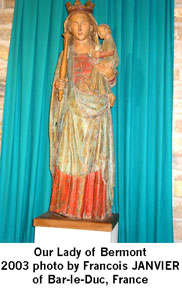
Apparently even back then, godparents were largely a ceremonial role, as Jehanne says that only her mother taught her about the faith. All agree that she is an exceptionally pious child and raised a good Catholic. They all agree on her parents outstanding honesty and virtue. Some of the other children tease Jehanne for being "so religious". Jehanne is known to be very generous and comfort the sick. She often goes on Saturday to a chapel called the Notre Dame de Bermont to light candles and prays. She is excellent at sewing linen fabrics and spinning wool. When she hears the church bells ring, she goes to her knees to pray.
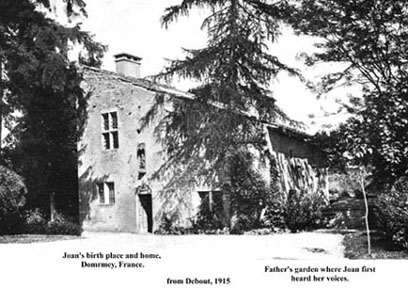
The exact date is not known. She first hears the voices sometime in her 13th year (that would be the time between her 12th and 13th birthday). It occurs in midsummer in her father’s garden. At first she is afraid. She sees a light off to her right and hears the angelic voices. At first the voices tell her to be good and to go to church. Later on they will tell her she must go into France to repel the English and crown Charles the king. She sees and hears them two or three times per week. At first Michael the archangel comes to her. Later on, he says that Saint Catherine and Saint Margaret will come to her with instructions from her Lord Jesus. She is able to touch them with her right hand, the hand that bears the ring with the inscription "Jhesus Maria" and was a gift from one of her parents. She says that they have a lovely aroma. Sometimes she kisses the ground they stand on to do them reverence. She says that when they depart, she wishes she could go with them. Jehanne tells no one about her angelic visits.
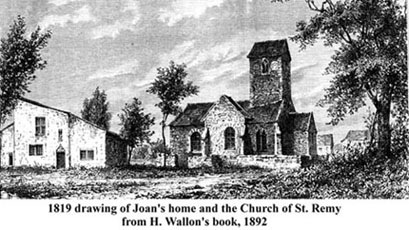
The date is unknown. Jacques Darc has a dream (approximately two years after Jehanne starts seeing the angels) that Jehanne goes off to follow the army. He believes this can only mean one thing; that Jehanne has become a prostitute. He does not discuss this with Jehanne herself, but frequently with his wife Isabelle. He tells his sons that if Jehanne does this, they must go after her and drown her rather that let her disgrace herself in this way, or if they are unwilling to do it, he will do it himself. Isabelle tells Jehanne many times about Jacques concern about her going off to follow the army. How Jehanne must have longed to tell her parents about God’s messenger angels! But she was afraid, lest somehow she might be stopped from ultimately doing God’s will.
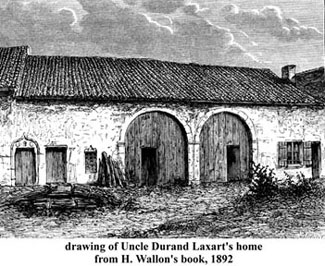
Jehanne’s voices are more insistent that she goes into France. She must reach the king by mid-Lent (approximately 10 months from now). Jehanne requests to visit her uncle (really the husband of her cousin, but called "uncle" since he is almost 40 years old) Durant Lassois in Burey, some 10 miles away from Domremy. Once there, she asks her Uncle Durant to take him to see Robert Baudricourt, captain of the nearest town loyal to France. He has had dealings with him before in representing the town in official business. Jehanne gains an audience and tells Baudricourt she must go to the King. He dismisses her and tells Durant to take her home and administer a beating to restore some sense to her. By now Durant’s wife is pregnant and expecting in January. I believe Jehanne knows she will have another opportunity to return to Vaucoulers at that time.
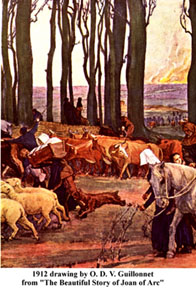
Domremy is the victim of a Burgundian raiding party. The inhabitants flee. One historian suggests the raiding party is in response to word leaking out as regards Jehanne revealing her mission to Baudricourt in May. The Burgundians may have felt threatened and sought to put on a "show-of-force." The Darc family takes up residence at an inn run by the La Rousse family in Neachateau for approximately three weeks. Jehanne helps the owner of the inn with household chores and spinning. When they return home, they find the church burned as well as some homes, but Jehanne’s house has been spared. They must attend a nearby church at Greux, about 2-3 miles away.
The breech of promise action is possibly heard at Toul. Jehanne is sued an unknown young man on the supposition that she promised to marry him. Jehanne’s voices tell her she will win the case. Likely Jehanne’s parents have helped arrange a potential marriage, but Jehanne says she never promised. The court believes her and dismisses the case. The exact date of this trial is not known; some suppose it took place in the summer of 1428, but others think it happened in February 1429. It seems possible, that in 1428, with Jehanne now 16 years ago, and certainly within age to be married, that her parents, alarmed by her first visit to Vaucouleurs in May 1428 to declare her heavenly mission, seek to get her married as soon as possible. If this were the case, it would seem unlikely the potential husband would have sued Jehanne so quickly as for the date to be in summer of 1428. He likely would have waited, and then having seen her leave for Vaucouleurs, seek to get her back by this lawsuit. Thus I opt for the February 1429 date.